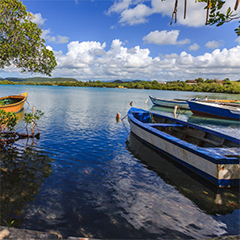Trojan brings power to the northern state of Choco, located in western Colombia, in the Municipality of Acandi, an area that is mainly jungle, along the Caribbean Sea bordering Panama. This region is in a remote area of the country that is not tied to an electrical grid.
The Colombian government issued a mandate to expand the availability of electricity to the remote area of Acandi by building five solar hybrid installations, or microgrids. Acandi is mostly jungle, located on the Caribbean Sea bordering Panama, and its remoteness made it impossible to effectively connect to the country’s main electrical grid. These communities were forced to rely on diesel generators which only provided power for a few hours each day.
The government decided to improve electricity service to the communities using state-of-the-art solar photovoltaic technology with energy storage powered by advanced deep-cycle batteries.
One of the greatest incentives to installing these microgrids was to reduce the use of diesel fuel. Not only were the generators loud and emitted pollutants, but because the area can only be accessed by boat, the cost to transport fuel is prohibitively high. Also, when a generator broke down, the community would have to go without electricity until someone could fix it—which could be a while in these remote locations.
This project is the first of its kind in the Choco region and allowed 431 households, including an indigenous community, to have access to clean, affordable and reliable energy for the next 20 years.
“One of the greatest incentives to installing these microgrids was to reduce the use of diesel fuel,” said Ana Maria Murillo, Business Director of Tecmac Ingenieria, the project’s solar installer.



























